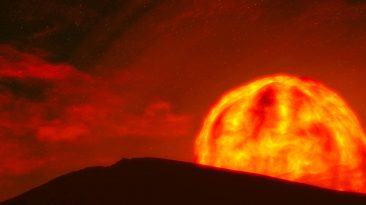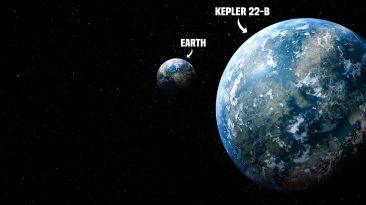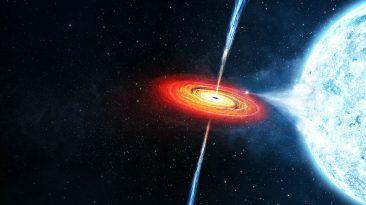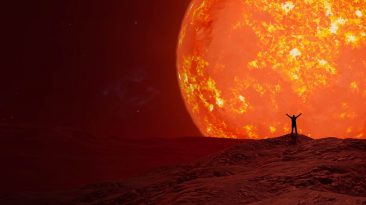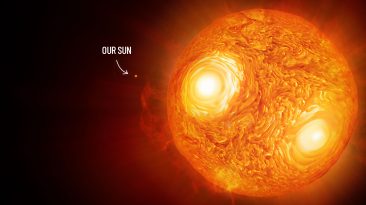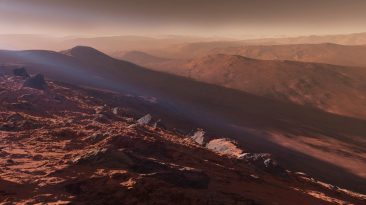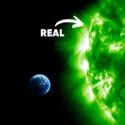Ever feel like the Earth is just too small? Well, let’s make it bigger. Much, much bigger. Welcome to a new Earth that is just as big as Jupiter. In what ways would the Earth change? What things would stay the same? And how would this affect you?
A super-Earth is a planet with a mass up to 10 times bigger than the Earth. But don’t let the name deceive you. These super-Earths aren’t anything like the Earth you know. These planets could be rocky or covered entirely in ice. They could even be gaseous like Neptune. But if you want to make the Earth as big as Jupiter, get ready to make a super-super-super Earth.
While Earth as it exists now is much smaller than Jupiter, it is a pretty dense rock compared to the gas giant. Our new planet would be massive. About 1,300 times bigger than Earth today. And that’s not the only thing that would be different. Jupiter has a radius about 11 times that of the Earth. Get used to a little more gravity when you walk around. 11 times more.
So if Earth was this huge, how soon would the gravity completely crush your body? This change in size would have enormous implications for you and all other life on Earth. The first thing you’d notice with 11 times the surface gravity is that you would weigh more. And there’s not much a diet plan could do to change that. You’d be 11 times heavier than you are now.
So if you currently weigh 70 kg (155 lb), get ready to start lugging a hefty 770 kg (1,700 lb) around. Would you even be strong enough to carry your own weight? You’d be heavier than the world deadlifting record of 501 kg (1,104 lb) held by Game of Thrones star Hafthor Bjornsson. So, yeah, good luck.
But if you are a couch potato, this could be good news. Getting up from the couch wouldn’t be an option. You wouldn’t have the muscle strength. Even breathing would be a near-impossible task. Scientists have concluded that the maximum gravitational field that humans could adapt to is about five times the gravity of Earth. Now double that, and that would be the new normal.
And you wouldn’t be the only one feeling heavier. All that gravity would result in increased atmospheric pressure. Yeah, you would feel the air pressing down on you. This would have severe environmental impacts. Water molecules would need more energy to escape their liquid form. That means the boiling temperature of water would be much higher than 100 °C (212 °F).
And the freezing point would now be way below 0 °C (32 °F). It would be harder for you to make ice. And even the large chunks of ice like icebergs could melt away. And, there would be disruptions beyond life on the surface of the Earth. Introducing a massive planet into the Solar System would create some serious instabilities.
Our Moon would experience extreme changes in tidal forces. This gravity could be strong enough to pull the Moon apart into teeny-tiny pieces. The only remnant you’d have left would be a new ring of debris forming around Earth. The Sun would still be 250 times more massive than our new Earth. So Earth wouldn’t steal any planets away.
But our super-Earth could have some effect on their orbit, just as Venus and Jupiter impact our orbit and climate today. The Earth would affect the orbits of other celestial bodies like asteroids. Our gravitational pull could be strong enough to eject these objects from the asteroid belt and set them on a collision path with you.
And that would be bad news. Remember, you wouldn’t be able to move a muscle to escape. So maybe it’s better if Earth stays the same size as it is now. Or maybe it could be even bigger. Like the Sun.
Sources
- “Jupiter Compared To Earth”. Matt Williams. 2016. universetoday.com.
- “Density Of The Earth”. Jerry Coffey. 2009. universetoday.com.
- “Effects Of Gravity On The Body”. 2022. evolutionhealth.com.
- “Effects of exoplanetary gravity on human locomotor ability”. Nikola Poljak, Dora Klindzic and Mateo Kruljac. 2018. arxiv.org.
- “What’s The Maximum Gravity We Could Survive?”. Michael Allen. 2018. discovermagazine.com.














